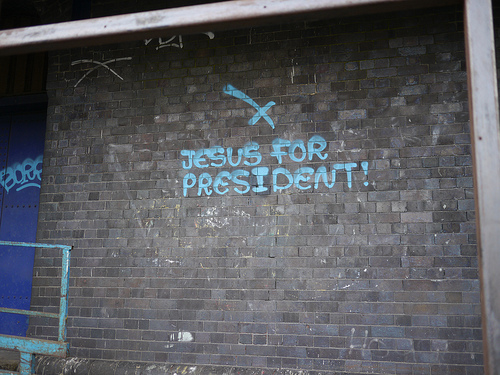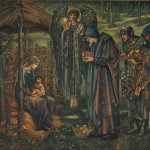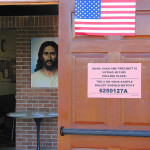We run our website the way we wished the whole internet worked: we provide high quality original content with no ads. We are funded solely by your direct support. Please consider supporting this project.

12 Reasons for Keeping the Kingdom of God Separate from Politics, Part 1
Image by the justified sinner via Flickr
- Jesus came to establish a kingdom that was not of this world. This is why Jesus refused to call on angels to defend himself and why he forbid his followers to use violence to defend themselves or advance their cause. It’s also why neither Jesus nor Paul nor any other NT author ever tried to advance the kingdom or influence society through political means. As representatives of the kingdom of God, we are called to do nothing more or less than what Jesus did. The kingdom of God always looks like Jesus, dying out of love for the people who crucified him. Following his example, kingdom people are called to transform the world not by the power of the law but by the much greater power of Christ-like, self-sacrificial love. Our central call is to “be imitators of God” and to “live in love as Christ loved us and gave his life for us” (Eph 5:1-2). We are to follow Jesus’ example in all things.
- People in Jesus day consistently tried to get him to “weigh in” on the political options of his day, yet Jesus consistently refused. He resisted the devils temptation to acquire the “glory and authority” of nations by any means except through self-sacrificial love. Jesus’ goal wasn’t to provide us with “God’s opinion” on the “right” political option or “right” nationalistic agenda. His goal was to provide a radical alternative kingdom to all political options and all nationalistic agendas. Followers of Jesus are called to imitate this attitude and behavior. We may participate in government however we feel called, but must never confuse this participation with our unique calling to represent the kingdom of God.
- All versions of the kingdom of the world retaliate when harmed or (sometimes) threatened, but kingdom people are never to retaliate, never return evil with evil, but instead return evil with good (Matt 5:37). Governments and political parties always act in their own self-interest, but kingdom people are to always sacrificially act in the interests of others. Kingdom people are to bless those who persecute us, pray for those who mistreat us and to prefer serving others above being served by others. Political parties and nations don’t do this. Kingdom people are to never do anything except in a way that manifests Christ’s love, never to insist on having our own way (as in fighting for our “rights”), never to participate in violence and to always consider our own sins, however “minor,” to be tree trunks in our own eyes while viewing other people’s sins, however “major,” to be mere dust particles. This is antithetical to the way political parties and nations operate. This radically unique, loving, humble, servant-hood demeanor manifests the holiness of the kingdom of God and it is compromised when Christians in any way associate the kingdom of God with any political party or nation.
- The Church is called to be the ‘body of Christ” because it is to do exactly what Jesus did in his incarnate body. Though he was sinless, Jesus attracted “tax collectors,” prostitutes,” and other “sinners” who were the most despised people of his day by loving them and serving them just as they were. Never did he try to pass laws against them. The publicly expressed concern by Christians to pass laws against people who have sins they don’t have is one of the reasons the “body of Christ” is not attracting sinners like Jesus did. It is one of the primary reasons Christians are known for many (mostly negative) things but not known for our outrageous, Calvary-like love. Yet, it is our love, above all else, that God says we are supposed to be known for (Jn 13:35). Indeed, this is the primary way the world is to become convinced Jesus is Lord.
- Israel was the one nation in history that was once “under God” (forming a theocracy). Yet Jesus rejected the many attempts of people to get him to use political power to “take Israel back for God.” Jesus was showing us that the kingdom of God can’t be associated with any national or political ideology. If Jesus didn’t associate the nation of Israel more closely with the kingdom of God than any other nation, how much less should Christians today be inclined to associate America or any other nation or political agenda with the kingdom of God? And if Jesus didn’t try to use political power to “take Israel back for God”—though many wanted him to—how much less should his followers today be inclined to try to “take America back for God” through political means? (Also, it’s not clear when America “belonged to God.” It was founded on violence, genocide, and slavery.)
- Satan owns the “glory and authority” of “all the kingdoms of the world” (including America!) and he gives this authority to anyone he pleases (Lk 4:5-6). Jesus refused the devil’s temptation to acquire the authority to rule others by any means other than through self-sacrificial love, expressed on Calvary. His followers are called to resist this same temptation and follow his example.
Category: General
Tags: Kingdom, Politics
Topics: Ethical, Cultural and Political Issues
Related Reading

The Problem with Mixing Church & Government
Image by fusion-of-horizons via Flickr Some people insist that the only reason that neither Jesus nor anyone else in the first several centuries of the church tried to dominate the political system of their day was because they were a small minority of people living in a nondemocratic and hostile environment. By contrast, the argument goes,…

A Kingdom Not of This World
Bruxy Cavey spoke at Woodland Hills Church back in May as a part of the Tapestry series, and this is a little snippet of his sermon. It’s a wonderful description of the Anabaptist approach to politics. Take a look!

Christmas is Subversive…
…at least the first Christmas was. When Jesus came it was about the birth of a subversive ruler who brought a subversive kingdom. He is a king that came to introduce a reign that would overthrow the world. Click here for a brief reflection by Greg on Subversive Christmas, brought to you by Nomad.

We’re in This Together: Unity and Disunity
Hartwig HKD via Compfight Christena Cleveland has been doing a series called Beyond Multiethnic on her blog for the last several weeks. It’s superb. In her introductory post, she states: I’m excited about the booming interest in multiethnic/multiracial church, I really am. But racial/ethnic divisions are really just the tip of the iceberg; they’re often the most glaring…

Election Benediction
On this election day, when so many Americans are experiencing high levels of anxiety, I thought it would be good to share an “Election Benediction” that was written and sent to me by Kenneth Tanner. Let it ground you in the love, peace and security of Christ and his Kingdom. An Election Benediction By Kenneth…

Conservative/Liberal are not Theological Categories
We wanted to repost something by Jonathan Martin today that struck a chord with us about the theological emptiness of political boxes. It’s brief and beautifully written and we hope you’ll read the entire article here. For those of you who are weary of the political tug-of-war for your soul, here’s some hope: And so…
